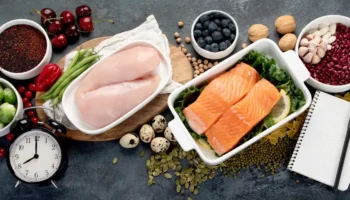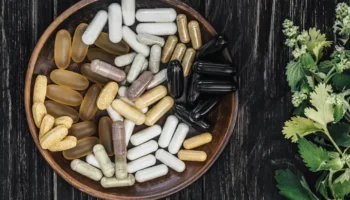As I navigate pre-menopause, I’ve realized how key vitamin B12 is for my health. It’s especially important during this time, as it affects my well-being. Knowing about vitamin B12’s role is vital1.
Vitamin B12 helps keep red blood cells healthy, supports nerve function, and aids in DNA production. This makes it crucial for pre-menopause2. Without enough vitamin B12, I could feel tired, weak, and experience nerve issues. So, it’s important to grasp the benefits and importance of vitamin B121.
For women over 14, the daily vitamin B12 requirement is 2.4 micrograms, and this is especially important during pre-menopause. I’ve learned that B12 plays a huge role in maintaining health during this time, making it essential to really understand its benefits.
Important Insights
- Vitamin B12 is essential for maintaining healthy red blood cells, nerve function, and DNA production.
- A deficiency in vitamin B12 can lead to fatigue, weakness, and neurological issues, highlighting its importance for overall health.
- The recommended daily intake of vitamin B12 for women aged 14 and older is 2.4 micrograms.
- Vitamin B12 is especially important for women in pre-menopause, as it supports energy levels and overall well-being during this time.
- Understanding the benefits of vitamin B12 allows women to take control of their health and prevent deficiencies.
- A balanced diet and supplements (if needed) can help prevent vitamin B12 deficiency, supporting better health through pre-menopause and beyond.
Understanding Vitamin B12 and Its Role in Women’s Health
Vitamin B12 is key for making red blood cells, keeping nerves healthy, and making DNA. A vitamin b12 deficiency can cause anemia, nerve problems, and heart disease risk3. Women, especially those going through pre menopause symptoms, need vitamin B12 to fight fatigue, keep nerves working, and stay healthy.
Vitamin b12 supplements can help fix vitamin B12 deficiency symptoms. This is common in chronic stomach issues and problems absorbing food-bound vitamin B123. It’s vital for women to know about vitamin B12 deficiency risks, especially before menopause, and keep their levels up.
Studies show vitamin B12 might also help prevent heart disease, stroke, and some cancers4. It’s also key for nerve health, making red blood cells, and brain function. It might even help prevent osteoporosis and macular degeneration4.
In short, knowing how vitamin B12 affects women’s health, especially before menopause, is crucial. Women should watch out for vitamin b12 deficiency risks and keep their levels right. This might mean taking vitamin b12 supplements if needed5.
The Connection Between Vitamin B12 and Pre-Menopause
Women during pre-menopause and menopause often face symptoms like hot flashes, mood swings, and fatigue. Vitamin B12 is key in easing these pre menopause symptoms and boosting health. A lack of vitamin B12 can worsen these symptoms, causing more fatigue, mood swings, and less energy6.
Keeping vitamin B12 levels up during pre-menopause is vital. The best vitamin b12 sources are animal products like fish, meat, poultry, and eggs6. Vegans might struggle to get enough B12 from food alone. Luckily, tests from Thriva or Medicheck are affordable for checking B12 levels6.
Studies show that low B-2, B-6, and B-12 levels can harm bone density, raising osteoporosis risk in menopause7. A 2018 study found that B vitamin deficiencies, including B12, in menopause can harm health7. It’s important to keep vitamin B12 levels up to support bone health and ease vitamin b12 pre menopause symptoms.
Signs of B12 Deficiency During Pre-Menopause
Vitamin B12 deficiency can show up in many ways. You might feel tired, weak, or have trouble breathing8. You could also notice mood swings, depression, or feel anxious9. It’s important to spot these signs early because not treating it can cause serious health problems.
Some common signs of vitamin B12 deficiency include:
- Fatigue and weakness
- Shortness of breath
- Mood swings and depression
- Anxiety and irritability
If you keep feeling these symptoms or they get worse, you should see a doctor. They can test your blood for B12 levels and suggest treatments like supplements or injections8. Knowing how to take B12 and why supplements are important can help you feel better and avoid serious health issues9.
It’s also important to know what can lead to B12 deficiency. This includes what you eat and some medicines8. By understanding these risks and taking steps to avoid them, women can stay healthy during pre-menopause.
| Factor | Description |
| Dietary choices | Vegan or vegetarian diets can increase the risk of vitamin B12 deficiency |
| Certain medications | Antacids, antihistamines, and blood sugar-lowering drugs can impact B12 absorption |
How Pre-Menopause Affects B12 Absorption
During pre-menopause, women may see changes in their digestive system. These changes can lead to less stomach acid and poor nutrient absorption. This can lower vitamin b12 levels10. It’s important to watch vitamin b12 daily intake and find the best b12 supplement for premenopausal women11.
Experts say women need at least 4 µg of vitamin B12 each day to avoid deficiency10. Studies also show that more vitamin B12 can help fight depression12. Since age can make it harder to absorb B12 from food, supplements are often needed12.
For pre-menopausal women, it’s key to:
- Keep vitamin b12 levels up with a good diet and supplements10
- Watch vitamin b12 daily intake to avoid deficiency11
- Pick the best b12 supplement for premenopausal women based on personal needs12
| Vitamin | Recommended Daily Intake |
| Vitamin B12 | at least 4 µg |
| Vitamin D | 25 mcg to 100 mcg |
| Calcium | 1,200 mg |
By knowing how pre-menopause affects B12 absorption and taking steps to keep levels up, women can lower the risk of deficiency and health problems101112.
Best Natural Sources of Vitamin B12
Vitamin B12 is key for healthy red blood cells, nerves, and DNA. It’s found in animal-based foods, which are the richest sources. This nutrient is vital for our bodies.
Lamb liver, beef or veal liver, clams, tuna, and trout are top sources of vitamin B1213. A 3.5-ounce serving of lamb liver has 3,571% of the Daily Value (DV) for vitamin B1213. Fortified plant milk and cereals are also good options for those who need more.
Here are some examples of vitamin B12-rich foods:
- Lamb liver: 3,571% of the DV per 3.5 ounces
- Beef or veal liver: 3,000% of the DV per 3.5 ounces
- Clams: over 7,000% of the DV in 20 small clams
- Tuna: 453% of the DV per 3.5 ounces
Eating foods rich in vitamin B12 is important for health. For those who can’t get enough, supplements are a good option.
| Food | Vitamin B12 Content |
| Lamb liver | 3,571% of the DV per 3.5 ounces |
| Beef or veal liver | 3,000% of the DV per 3.5 ounces |
| Clams | over 7,000% of the DV in 20 small clams |
Choosing the Right B12 Supplement
When picking a vitamin B12 supplement, think about the form and how well it’s absorbed15. Methylcobalamin and adenosylcobalamin are top choices because they’re easily taken in by the body15. Look for supplements with these forms to find the best for premenopausal women.
Knowing how to take B12 supplements is key. Adults need 2.4mcg of vitamin B12 daily15. You can take B12 supplements by mouth, and it helps to take them with food for better absorption16. Also, picking a trusted brand is important for quality and effectiveness.
When choosing a vitamin B12 supplement, consider these points:
- The form of vitamin B12 used
- The absorption rate
- The recommended daily dosage
- The brand reputation
By looking at these factors, premenopausal women can pick the best B12 supplement. This ensures they get enough vitamin B12 for their health16.
Monitoring Your B12 Levels
It’s important to check your vitamin b12 levels often, especially before menopause. This helps catch vitamin b12 deficiency early. Early treatment can prevent serious health problems19. In the U.S. and U.K., about 6% of adults under 60 have low B-12 levels. For those over 60, the rate jumps to nearly 20%19.
The role of vitamin b12 is huge. It helps make healthy red blood cells and keeps the nervous system working right20. Signs of vitamin b12 deficiency include feeling tired, irritable, and numb. These symptoms can harm your nervous system21. To check your vitamin b12 levels, you need a blood test. Normal levels are between 160 to 950 pg/mL19.
Knowing the risks of vitamin b12 deficiency is key. Eat a balanced diet with fortified foods. If needed, take supplements21. Here’s a table showing how much vitamin b12 you need each day:
| Age Group | Daily Vitamin B12 Requirement |
| Birth to 6 months | 0.4 mcg |
| 7 to 12 months | 0.5 mcg |
| 1 to 3 years | 0.9 mcg |
| 4 to 8 years | 1.2 mcg |
| 9 to 13 years | 1.8 mcg |
| 14 to 18 years | 2.4 mcg |
| Adults (19 and older) | 2.4 mcg |
Understanding the importance of vitamin b12 is vital. By keeping an eye on your vitamin b12 levels, you can lower your risk of vitamin b12 deficiency and its health problems20.
Conclusion: Taking Control of Your B12 Health During Pre-Menopause
Keeping your vitamin B12 levels right is key for women going through pre-menopause22. Knowing how important B12 is and making sure you get enough can help a lot. It can make you feel better, reduce bad symptoms, and even boost your brain power22.
Getting enough B12 can be easy, whether it’s through food or supplements. Making B12 a priority can really improve your life during this big change.
You’re not alone in this journey22. With a bit of knowledge and action, you can manage your B12 health and do well during pre-menopause22. By staying informed and talking to your doctor, you can create a plan to keep your B12 levels healthy. This way, you can enjoy all the good things B12 can do for you22.
Start this new chapter with confidence22. Let your B12 levels be a source of strength as you move forward.
FAQ
What is the importance of vitamin B12 for women during pre-menopause?
Vitamin B12 is key for healthy red blood cells, nerve function, and DNA. It helps prevent fatigue and supports energy. It also helps with symptoms like hot flashes and mood swings.
What are the signs of vitamin B12 deficiency during pre-menopause?
Signs of B12 deficiency include fatigue, weakness, and shortness of breath. Mood swings, depression, and anxiety are also common. Without treatment, it can cause serious health issues.
How does pre-menopause affect vitamin B12 absorption?
Pre-menopause can change digestion, leading to less stomach acid and poor nutrient absorption. This makes it harder to get enough B12. Hormonal changes also affect how the body uses B12.
What are the best sources of vitamin B12?
Animal-based foods like meat, fish, and dairy are good sources of B12. Plant-based options like fortified plant milk and cereals are also good. Some foods are fortified with B12, making them easy to find.
How much vitamin B12 do pre-menopausal women need?
Pre-menopausal women need 2.4 micrograms of B12 daily. Taking supplements at the right time helps with absorption. Be careful of interactions with other medicines.
Why is it important to monitor vitamin B12 levels during pre-menopause?
Checking B12 levels is vital to catch deficiencies early. It lets you start treatment quickly. Regular tests also show if supplements and diet changes are working, keeping B12 levels healthy.
Source Links
- https://www.healthline.com/health/menopause/vitamins-for-menopause – Vitamins for Menopause: What Works?
- https://www.avogel.co.uk/health/menopause/videos/B12-deficiency-in-perimenopause-and-menopause-signs-and-symptoms/ – B12 deficiency in perimenopause and menopause: Signs and symptoms
- https://lpi.oregonstate.edu/mic/vitamins/vitamin-B12 – Vitamin B12
- https://www.avantgynecology.com/2022/06/16/key-vitamins-for-womens-nutritional-goals/ – Key Vitamins for Women’s Nutritional Goals
- https://www.mayoclinic.org/diseases-conditions/depression/expert-answers/vitamin-b12-and-depression/faq-20058077 – Vitamin B-12 and depression: Are they related?
- https://hillstart.me.uk/b12-for-menopause/ – Why B12 Is An Important Vitamin For Menopause – Hill Start Nutrition
- https://www.medicalnewstoday.com/articles/317864 – Menopause: Do vitamins help?
- https://www.menopausenaturalsolutions.com/blog/Vitamin-B12-and-menopause – Vitamin B12 and Menopause
- https://www.medicalnewstoday.com/articles/symptoms-of-b12-deficiency-in-females – Symptoms of B12 deficiency in females
- https://us.typology.com/library/is-there-a-benefit-of-vitamin-b12-during-menopause – Menopause: Is it beneficial to use Vitamin B12?
- https://www.thebodyagency.com/blogs/article/could-nutrition-be-the-key-to-reducing-hot-flashes-and-other-menopausal-symptoms – Could Nutrition Be the Key to Reducing Hot Flashes and Other Menopausal Symptoms?
- https://www.oova.life/blog/perimenopause-vitamins?srsltid=AfmBOop5LjSFkpkxvoQE5VpBAsgNH278prtqQsPd2d6XtYbFAEQctQe2 – Unlocking Relief: 7 Perimenopause Vitamins for Managing Symptoms
- https://www.healthline.com/nutrition/vitamin-b12-foods – Vitamin B12 Foods: 12 Great Sources
- https://www.medicalnewstoday.com/articles/vitamin-b12-foods – Vitamin B12 foods: What to eat and avoid
- https://hellobonafide.com/blogs/news/b-vitamins-for-menopause – B Vitamins for Menopause | Benefits of B Complex Vitamins | Bonafide
- https://www.mountsinai.org/health-library/supplement/vitamin-b12-cobalamin – Vitamin B12 (Cobalamin) Information | Mount Sinai
- https://carolinehillnutrition.co.uk/supplements-menopause/ – Supplements for the Menopause: what should you take? – Caroline Hill Nutrition
- https://pmc.ncbi.nlm.nih.gov/articles/PMC7186155/ – Dietary intakes of vitamins B2, B6, and B12 and ovarian cycle function among premenopausal women
- https://www.healthline.com/health/vitamin-b12-level – Vitamin B-12 Level Test: Purpose, Procedure & Results
- https://ada.com/conditions/vitamin-b12-deficiency/ – Vitamin B12 Deficiency: Signs, Causes and Treatments | Ada
- https://joylux.com/blogs/news/vitamin-b12-brain-fog-menopause – Understanding Vitamin B12 Deficiency During Menopause
- https://pmc.ncbi.nlm.nih.gov/articles/PMC11127608/ – Impact of Serum Vitamin D, B6, and B12 and Cognitive Functions on Quality of Life in Peri- and Postmenopausal Polish Women







